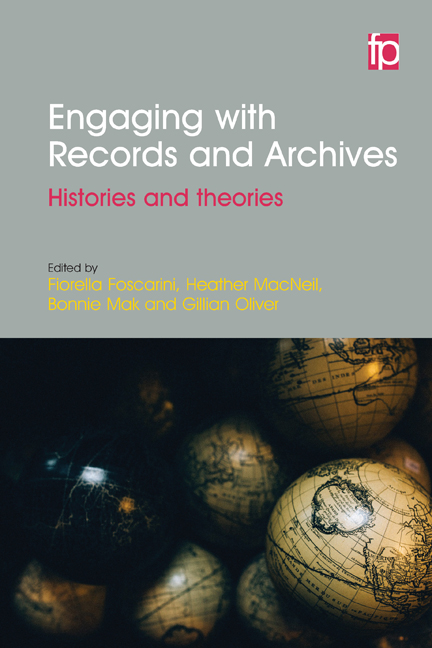Book contents
- Frontmatter
- Frontmatter
- Editors and contributors
- Editors’ introduction
- PART 1 RETHINKING HISTORIES AND THEORIES
- 1 Moving the margins to the middle: reconciling ‘the archive’ with the archives
- 2 Organisms, skeletons and the archivist as palaeontologist: metaphors of archival order and reconstruction in context
- 3 ‘Records in context’ in context: a brief history of data modelling for archival description
- 4 Mapping archival silence: technology and the historical record
- 5 Hidden voices in the archives: pioneering women archivists in early 20th-century England
- PART 2 ENGAGING RECORDS AND ARCHIVES
- Index
5 - Hidden voices in the archives: pioneering women archivists in early 20th-century England
from PART 1 - RETHINKING HISTORIES AND THEORIES
Published online by Cambridge University Press: 08 June 2018
- Frontmatter
- Frontmatter
- Editors and contributors
- Editors’ introduction
- PART 1 RETHINKING HISTORIES AND THEORIES
- 1 Moving the margins to the middle: reconciling ‘the archive’ with the archives
- 2 Organisms, skeletons and the archivist as palaeontologist: metaphors of archival order and reconstruction in context
- 3 ‘Records in context’ in context: a brief history of data modelling for archival description
- 4 Mapping archival silence: technology and the historical record
- 5 Hidden voices in the archives: pioneering women archivists in early 20th-century England
- PART 2 ENGAGING RECORDS AND ARCHIVES
- Index
Summary
I HAVE BEEN THINKING about the public voice of the archivist, according to Hilary Jenkinson (1948, 31) ‘the most selfless devotee of Truth the modern world produces’. Jenkinson told us that the archivist's career ‘is one of service. He exists in order to make other people's work possible’. Jenkinson also urged the archivist not ‘to import into the collection under his charge what we have been throughout most anxious to keep out of it, an element of his personal judgement’ (Jenkinson, 1937, 149). In other words, archivists should leave their own views aside, should be detached and impartial, should not leave any mark or inscription on the archive, should not be seen and should not be heard. This notion of anonymity is a trope in archival discourse. Archivists dance over the archive imagining that they hardly leave a trace of themselves, of their actions and decisions. Archivists have understood themselves as not apparent in the archive. But, in their actions archivists do leave impressions on the archive; they are at the same time everywhere and nowhere. Can we hear the voice of the archivist? Do archivists document themselves? Or are archivists ‘sans-papiers’, the undocumented, the persons without identity papers (Derrida, 2005, 55)? Derrida examined the link between archives and identity, naming and existing, silence and presence. He reflected on secrecy and openness, the past leaving its traces in the future through the archive, and asked ‘what becomes of its archive when the world of paper … is subordinated to … new machines for virtualization? Is there such a thing as a virtual event? A virtual archive?’ (2005, 2). Or, one might add, a virtual archivist? Are archivists afraid of being identified and named? The phenomena of archives and the voices of archivists are explored in the literatures of other disciplines (Cvetkovich, 2003; Steedman, 2001). But philosophical, historical, literary and feminist writing overwhelms archival science; archivists are in danger of being drowned out, repressed, excluded and hidden.
I see an analogy between the presence and absence of the archivist in the archive and the voice of women in the public sphere, the right of women to be heard in public discourse.
- Type
- Chapter
- Information
- Engaging with Records and ArchivesHistories and Theories, pp. 83 - 104Publisher: FacetPrint publication year: 2016
- 2
- Cited by



